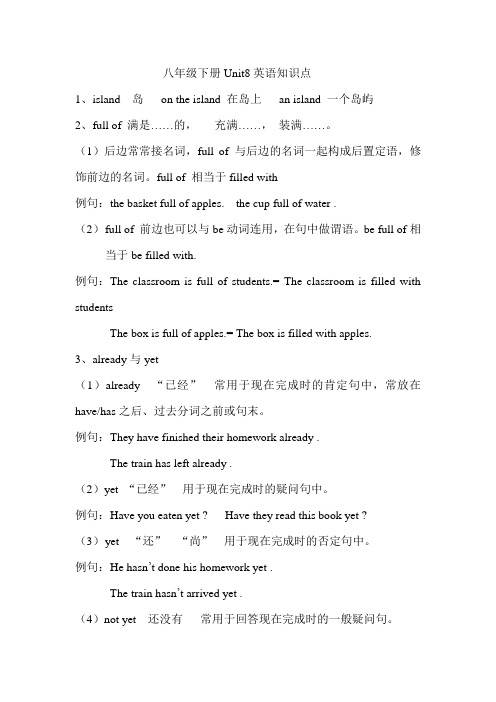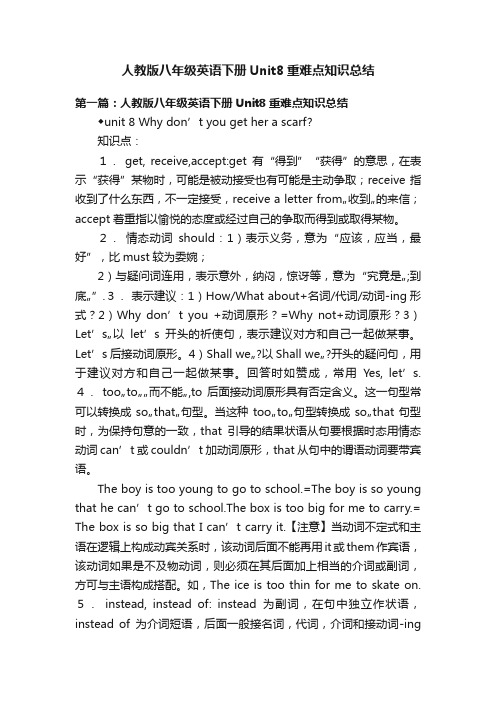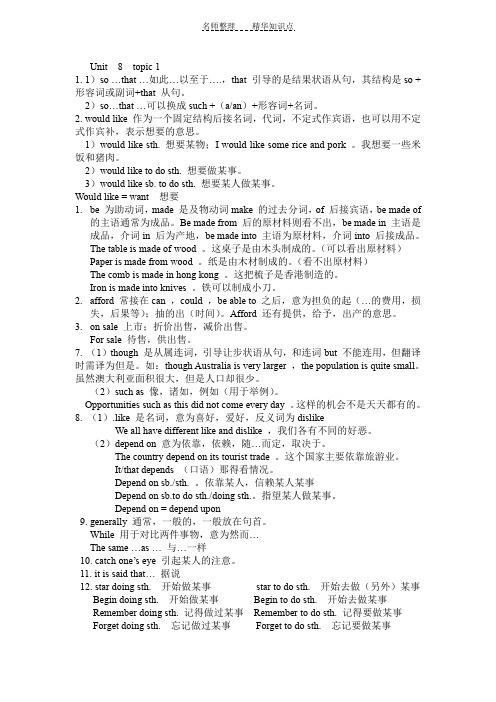八年级下册unit8单元知识点总结讲解学习
人教版八年级英语下册unit8单元知识点归纳总结

人教版八年级英语下册unit8单元知识点归纳总结Unit 8 Knowledge Summary n AHave you read "Little Women" yet。
This is an example ofthe present perfect tense。
The basic sentence structure for the present perfect tense is: subject + auxiliary verb "have/has" + past participle of the verb。
The auxiliary verb "have/has" can be usedin negative and n forms as well。
This tense is used to indicate the impact or result of an n that happened in the past on the present。
It is often used with adverbs such as "already," "yet," "never," "ever," "before," and "just." It can also be used to XXX up to the present。
often with time ns such as "since" or "for."For example。
"I have finished my homework。
so I am free now." This XXX being free at present。
新人教版英语八年级下册unit8重点讲解及练习题讲解学习

新人教版英语八年级下册u n i t8重点讲解及练习题语法聚焦:现在完成时 (Present Perfect Tense)1) 现在完成时的定义:(1)表示过去发生或已经完成的动作对现在造成的影响或结果。
—It’s so dark. 太黑了。
—Someone has turned off the light. 有人把灯关上了。
(2)表示从过去某一时间开始并一直持续到现在的动作或状态。
常与since+过去的时间点,for+一段时间,so far等时间状语连用。
I have lived here for ten years.我已经住在这里10年了。
(从10年前开始,持续到现在还住这儿)I have lived here since 2003. 自从2003年我就住在这儿。
(从2003年开始,持续到现在还住这儿)2) 现在完成时的构成及句式转换:助动词 have/has + 过去分词①I have finished my homework. (肯定句)②I have not finished my homework. (否定句)③—Have you finished your homework?—Yes, I have. / No, I haven’t, (一般疑问句及肯定、否定回答)现在完成时的标志:①常与just, already, yet, ever, never, before, so far 等连用,强调动作的完成,不强调动作的持续。
Have you ever been to Japan?I have just finished my homework.②for + 时间段;since + 过去的时间点;since + 段时间 ago;since + 一般过去时的句子。
They have known each other for five years.Since he was a child, he has lived in England.do __________ — ____________ go__________ — ___________ read ______ — ______ see _________ —______know____________ — _____________ eat _______ — _________ forget _________ —_________write________-______一、根据句意或汉语提示写词。
人教版八下英语u8笔记

人教版八下英语u8笔记
以下是有关人教版八下英语u8的笔记,供您参考:
Unit 8 grammar
一、被动语态的构成:
被动语态由助动词be和及物动词的过去分词构成,其基本结构为“be+及物动词的过去分词”。
使用被动语态时需要根据时态和人称进行变化。
二、被动语态的时态:
被动语态有多种时态,包括一般现在时、一般过去时、一般将来时、现在进行时、过去进行时、现在完成时、过去完成时等。
具体形式如下:
1. 一般现在时:am/is/are+过去分词
2. 一般过去时:was/were+过去分词
3. 一般将来时:will be+过去分词
4. 现在进行时:am/is/are being+过去分词
5. 过去进行时:was/were being+过去分词
6. 现在完成时:have/has been+过去分词
7. 过去完成时:had been+过去分词
三、被动语态的用法:
被动语态常用于以下情况:
1. 不知道或不想指出动作的执行者。
2. 强调动作的承受者。
3. 在科技文献和新闻报道中,为了强调客观事实。
4. 在一些习惯用法中,如“It is said that…”(据说……)和“He will be invited to the party.”(他将受邀参加聚会。
)等。
四、主动语态与被动语态的转换:
将主动语态转换为被动语态的方法是将宾语变成主语,将谓语变成被动结构(be+过去分词),将原主语放在by后面,作为被动句中的宾语。
如果原主语不出现,被动句中常常以it作为形式主语。
Unit8知识点和考点2022-2023学年牛津译林版八年级英语下册

8B Unit 8 A green world Ⅰ概况Ⅱ详细讲解1.We can reduce air pollution by riding bicycles.(1)reduce的基本含义作动词,意思是减少,降低(2)reduce的核心考点考察reduce和produce、realize和treat的词义区分。
reduce的意思是减少,降低;produce是导致,产生;realize是意识到,实现;treat是治疗,处理。
【2022年新城】1. —People are asked to wear breathing masks in public places again. —That’s it. The habit has ________ the possibility of catching COVID-19 viruses.A.reducedB. producedC. realizedD. treated 答案A2.More and more families own cars and this causes serious air pollution.(1)cause的基本含义作动词,意思是引起,使发生(2)cause的核心考点考察cause与make、recycle和improve的区分。
cause的意思是引起,使发生;make是制作;recycle是回收;improve是改进,改善。
2.The heavy rain ______ so many traffic accidents on the highway last Monday.A.madeB.recycledC.causedD.improved答案 C3.For example, we are not allowed to cut down trees.(1)allow的基本含义做动词,意思是允许(2)allow的核心考点之一考察allow与prevent、refuse和expect的词义区分。
Unit8全面知识点总结(词汇、短语、句型、语法、习作) 2020-2021学年人教版八年级英语下册

Unit8知识点全面总结(词汇到作文)2020-2021学年人教版八年级英语下册(词汇、短语、句型、语法、习作)一.课本词汇和用法1.full of 满是...的,大量...be full of 意为“充满/装满……”。
Oliver Twist is about a boy who goes2.out to sea(1)and finds an island full of treasures.Be full of 表示状态,意为“充满...的”full是形容词。
该(2)短语相(3)当于be filled with,意为“以...填充”,是一个被动语态,fill是动词。
例如:I always believe the world is full of love.= I always believe the world is filled with love. 我总是相信世界充满了爱。
full还有“饱的。
饱满的”,其反义词为hungry 饥饿的3.treasure [ˈtreʒər] n. 财富(不可数名词);珠宝,珍藏品(可数名词)例如:They went there to look for treasure. 他们去那里寻宝。
That island is full of treasures. 那座岛上都是珠宝。
4.Island [ˈaɪlənd] n. 岛,岛屿An island 一座岛5.Classic [ˈklæsɪk] n. 经典作品;名著(可数名词)Classical adj. 经典的;古典的;传统的例如:I like classical music. 我喜欢古典音乐。
6.page [peɪdʒ] n. (书刊或纸张的)页,面,张表示多少页用“数字+page(s)”表示在第几页时用“on page +数字”(无论数字是多少,page 都用单数)例如:100 pages 100页On page 56 在第56页7.hurry [ˈhɜːri] v. 匆忙,赶快hurry up 赶快,急忙Come on!或Be quick!hurry to + 地点名词,意为“匆忙去某地”。
仁爱英语八年级下册unit8知识点

仁爱英语八年级下册unit8知识点八年级下册unit8知识点详解Unit8是仁爱英语八年级下册的重要单元,本单元主要涉及到其它单元所学的语言技能,如听、说、读、写等。
它对学生的英语水平提高有非常重要的作用。
下面我们来详细讲解Unit8的知识点,希望能够对大家有所帮助。
一、单词及短语1. direction (n.) 方向2. turn left/right 向左/右转3. block (n.) 街区4. go straight (to…) 直走(到…)5. cross (v.) 穿过;过马路6. traffic light (n.) 交通灯7. on the corner 在街角8. opposite (prep.) 在……的对面9. next to 在……旁边10. between…and… 在……和……之间二、用法注意1.方向:大多数情况下,我们使用“turn left / right”来表示向左或右转,但有时也需要用其他动词,如“go/be on the left/right”。
2.过马路:当我们要表示在马路上横穿马路时,必须要用“cross”,不能直接使用“go”。
3.描述位置:我们可以使用“opposite”、“next to”、“between…and…”等词语来描述位置关系,但注意,这些词语只能用于描述两个对象之间,不能用来描述三个或以上的对象之间的位置关系。
4.描述路线:描述路线时,应该使用明确的指示物表示路径,如街角、交通灯、公交站等,避免使用不具体的词语,如“向北走”、“向右拐”之类。
三、语言运用1.如何给路人指路:当我们被人问路时,我们要先问对方的目的地和起点,然后给出清晰的指示,最后对方确认无误后,方可离去。
例如:A: Excuse me, can you tell me how to get to the nearest bank?B: Sure, where are you now?A: I’m at the intersection of Center Street and Park Avenue.B: OK, walk straight ahead along Park Avenue for one block, thent urn right at the traffic light. You’ll see the bank on your right.A: Thank you very much. Have a nice day!2.如何在陌生的城市出行:当我们在陌生的城市内旅行时,我们需要先规划好路线,了解目的地所在的位置和旅行的交通方式。
八年级英语下册第八单元知识点

八年级英语下册第八单元知识点
1. 时态:复习和巩固过去时、现在完成时、将来时等时态的用法和构成。
2. 定语从句:学习定语从句的构成和用法,如关系代词的使用和位置,以及定语从句的引导词等。
3. 虚拟语气:学习虚拟语气的用法,包括对过去和现在情况的虚拟表达,以及与情态动词的搭配等。
4. 情态动词:复习和巩固情态动词的用法,如表示能力、推测、建议等方面的用法。
5. 词汇和短语:学习一些新的词汇和短语,扩大词汇量,并学习它们的用法和搭配。
6. 阅读理解:进行阅读理解练习,提高阅读理解能力和阅读速度,并学习一些阅读技巧。
人教版八年级英语下册unit8单元知识点归纳总结

⼈教版⼋年级英语下册unit8单元知识点归纳总结Unit 8 知识点总结Section A1. Have you read Little Woman yet? 你读过《⼩妇⼈》这本书吗?【解析】现在完成时现在完成时的基本句型:肯定式:主语+ 助动词have/has + 动词的过去分词.疑问式:助动词Have/Has + 主语+ 动词的过去分词?否定式: 主语+ 助动词have/has + not + 动词的过去分词现在完成时的主要⽤法1.表⽰过去发⽣的某⼀动作对现在造成的影响或结果。
常和副词already, yet, never, ever ,before ,just等连⽤。
.I have finished my homework. I am free(我已经完成了家庭作业,对现在造成的结果是很有空)2.表⽰过去已经开始, 持续到现在的动作或状态.常与since + 过去的时间点,for + ⼀段时间,so far 等时间状语连⽤。
I have learnt English for more than ten years.我已经学了10多年的英语。
(从10年前开始,持续到现在还在学)She has swum since half an hour ago.我已经游泳了半个⼩时(半个⼩时前已经开始游泳,到现在还在游)already/ yet的区别:a)already 往往⽤于肯定句,⽤在疑问句时表⽰强调或加强语⽓;yet ⽤于否定句和疑问句。
He has already left here. 他已经离开这⾥了。
My teachers haven’t had breakfast yet. 我的⽼师们还没有吃早饭。
Have you written to your parents yet?【成都】45. —Jack, let’s go to see the movie Harry Potter.—Oh, I ______ it many times. So I don’t want to see it.A. have seenB. seeC. will see【⼴】33. —Why don’t you go to the movie with me, Betty?—Because I ______ it before.A. sawB. have seenC. see某⼈怎么样?What’s +⼈+like? ⽤来提问⼈的性格What do / does +⼈+ look like?⽤来提问⼈的外表。
(完整版)八年级下册Unit8英语知识点

八年级下册Unit8英语知识点1、island 岛on the island 在岛上an island 一个岛屿2、full of 满是……的,充满……,装满……。
(1)后边常常接名词,full of 与后边的名词一起构成后置定语,修饰前边的名词。
full of 相当于filled with例句:the basket full of apples. the cup full of water .(2)f ull of 前边也可以与be动词连用,在句中做谓语。
be full of相当于be filled with.例句:The classroom is full of students.= The classroom is filled with studentsThe box is full of apples.= The box is filled with apples.3、already与yet(1)already “已经”常用于现在完成时的肯定句中,常放在have/has之后、过去分词之前或句末。
例句:They have finished their homework already .The train has left already .(2)yet “已经”用于现在完成时的疑问句中。
例句:Have you eaten yet ? Have they read this book yet ?(3)y et “还”“尚”用于现在完成时的否定句中。
例句:He hasn’t done his homework yet .The train hasn’t arrived yet .(4)not yet 还没有常用于回答现在完成时的一般疑问句。
例句:Have you eaten yet ? Not yet.4、英语中,疑问词what/how/which/where/who/when 后边出现动词时,往往用“疑问词+ to do sth ”结构,此结构在句中可以做主语、宾语和表语.例句:I can’t decide when to start . please tell me what to do next .He doesn’t know where to live . Do you know which to buy ?5、finish doing sth 做完某事例句:Did you finish watching TV ? I have finished cleaning the room .6、put down 放下down是副词,接代词时,代词要放在中间。
英语八年级下册unit8知识点

英语八年级下册unit8知识点英语八年级下册unit 8主要学习了关于旅游的知识,以下是本单元的知识点总结。
1. 关于旅游的动词go sightseeing 游览take photos 拍照visit museums 参观博物馆go hiking 远足ride bikes 骑自行车relax 放松swim 游泳2. 关于旅游的名词national parks 国家公园beach 海滩mountains 山museums 博物馆zoo 动物园historic sites 历史遗址souvenirs 纪念品3. 询问旅游计划的句子Where are you going? 你去哪里?What are you going to do there? 你打算在那儿做什么? How long are you staying there? 你在那儿呆多久?Who are you going with? 你和谁一起去?4. 讨论旅游经验的句子How was your trip? 你的旅行怎么样?Did you enjoy your trip? 你旅行的时候玩得开心吗?What was your favorite part? 最喜欢的部分是什么?Did you take any photos? 你拍了照片吗?5. 描述目的地的句子It’s a great place to visit. 这是一处非常值得游览的地方。
There are many interesting things to do there. 那里有很多有趣的事情可以做。
The scenery is breathtaking. 风景令人惊叹。
The food is delicious. 食物非常美味。
6. 表示喜欢或不喜欢的句子I love/like... 我喜欢……I don’t like... 我不喜欢……I hate... 我讨厌……此外,本单元还学习了一些口语交际技巧和写作技巧,比如如何尊重当地文化和习俗,如何写旅游日记和邮件等。
人教版八年级英语下册Unit8重难点知识总结

人教版八年级英语下册Unit8重难点知识总结第一篇:人教版八年级英语下册Unit8重难点知识总结◆unit 8 Why don’t you get her a scarf?知识点:1.get, receive,accept:get有“得到”“获得”的意思,在表示“获得”某物时,可能是被动接受也有可能是主动争取;receive指收到了什么东西,不一定接受,receive a letter from…收到…的来信;accept着重指以愉悦的态度或经过自己的争取而得到或取得某物。
2.情态动词should:1)表示义务,意为“应该,应当,最好”,比must较为委婉;2)与疑问词连用,表示意外,纳闷,惊讶等,意为“究竟是…;到底…”.3.表示建议:1)How/What about+名词/代词/动词-ing形式?2)Why don’t you +动词原形?=Why not+动词原形?3)Let’s…以let’s开头的祈使句,表示建议对方和自己一起做某事。
Let’s后接动词原形。
4)Shall we…?以Shall we…?开头的疑问句,用于建议对方和自己一起做某事。
回答时如赞成,常用Yes, let’s.4.too…to……而不能…,to后面接动词原形具有否定含义。
这一句型常可以转换成so…that…句型。
当这种too…to…句型转换成so…that句型时,为保持句意的一致,that引导的结果状语从句要根据时态用情态动词can’t或couldn’t加动词原形,that从句中的谓语动词要带宾语。
The boy is too young to go to school.=The boy is so young that he can’t go to school.The box is too big for me to carry.= The box is so big that I can’t carry it.【注意】当动词不定式和主语在逻辑上构成动宾关系时,该动词后面不能再用it或them作宾语,该动词如果是不及物动词,则必须在其后面加上相当的介词或副词,方可与主语构成搭配。
八年级下册第八单元知识点归纳

Unit 8 topic 11. 1)so …that …如此…以至于….,that 引导的是结果状语从句,其结构是so +形容词或副词+that 从句。
2)so…that …可以换成such +(a/an)+形容词+名词。
2. would like 作为一个固定结构后接名词,代词,不定式作宾语,也可以用不定式作宾补,表示想要的意思。
1)would like sth. 想要某物;I would like some rice and pork 。
我想要一些米饭和猪肉。
2)would like to do sth. 想要做某事。
3)would like sb. to do sth. 想要某人做某事。
Would like = want 想要1.be 为助动词,made 是及物动词make 的过去分词,of 后接宾语,be made of的主语通常为成品。
Be made from 后的原材料则看不出,be made in 主语是成品,介词in 后为产地,be made into 主语为原材料,介词into 后接成品。
The table is made of wood 。
这桌子是由木头制成的。
(可以看出原材料)Paper is made from wood 。
纸是由木材制成的。
(看不出原材料)The comb is made in hong kong 。
这把梳子是香港制造的。
Iron is made into knives 。
铁可以制成小刀。
2.afford 常接在can ,could ,be able to 之后,意为担负的起(…的费用,损失,后果等);抽的出(时间)。
Afford 还有提供,给予,出产的意思。
3.on sale 上市;折价出售,减价出售。
For sale 待售,供出售。
7. (1)though 是从属连词,引导让步状语从句,和连词but 不能连用,但翻译时需译为但是。
如:though Australia is very larger ,the population is quite small。
八年级英语下册Unit 8知识讲解

八年级英语下册Unit 8知识讲解Unit 8h dn’t u get her a sarf?【单元目标】Ⅰ.单词与短语suggestin hse enter advantage reeivebesides ent enurage present trendspeial albu persnal instead useperfet pan asleep prgress benhSeden native nearlfall asleep 入睡give aa 赠送rather than 胜于hear f 听说suggest v 提议;建议tae an interest in 对……感兴趣ae friends ith 与……交友Ⅱ.目标句型:1 hat shuld I get fr sb…?2 H abut sth/ding sth?3 H d u lie sth?4 hat abut sth/ding sth?h dn’t u bu/get…? 6 h nt bu/get…?7 The’re t expensive/heap/persnal…8 Great!/Gd idea!/… I’ll get/bu…9 best gift is… 10 It’s gd fr sb t…11 It an ae sb…Ⅲ.重点句型1 h dn’t sb d sth?2 H abut结构3 t…t结构【重点词汇】1 iprve作不及物动词,表示“改进,改善”例如:His r is iprving sll他的工作提高得很慢。
His health is iprving他的健康正在好转。
也可作及物动词,表示“使某物改进,改善”。
例如:He studies harder t iprve his English他更加努力提高英语水平了。
This is nt gd enugh I ant t iprve it这还不够好,我要加以改进。
人教版八年级英语下册unit8单元知识点归纳总结

Unit 8 知识点总结Section A1. Have you read Little Woman yet? 你读过《小妇人》这本书吗?【解析】现在完成时现在完成时的基本句型:肯定式:主语+ 助动词have/has + 动词的过去分词.疑问式:助动词Have/Has + 主语+ 动词的过去分词?否定式: 主语+ 助动词have/has + not + 动词的过去分词现在完成时的主要用法1. 表示过去发生的某一动作对现在造成的影响或结果。
常和副词already, yet, never, ever ,before ,just 等连用。
.I have finished my homework. I am free(我已经完成了家庭作业,对现在造成的结果是很有空)2. 表示过去已经开始, 持续到现在的动作或状态.常与since + 过去的时间点,for + 一段时间,so far 等时间状语连用。
I have learnt English for more than ten years.我已经学了10 多年的英语。
(从10 年前开始,持续到现在还在学)She has swum since half an hour ago.我已经游泳了半个小时(半个小时前已经开始游泳,到现在还在游)already/ yet 的区别:a)already 往往用于肯定句,用在疑问句时表示强调或加强语气;yet 用于否定句和疑问句。
He has already left here. 他已经离开这里了。
My teachers haven’t had breakfast yet. 我的老师们还没有吃早饭。
Have you written to your parents yet?【成都】45. —Jack, let ’s go to see the movie Harry Potter.—Oh, I it many times. So I don ’t want to see it.A. have seenB. seeC. will see【广】33. —Why don’t you go to the movie with me, Betty?—Because I it before.A. sawB. have seenC. see2.What s’i t like? 它怎么样?【解析】某物怎么样?What’s +物+like? How+be + 物?某人怎么样?What’s人+ +like? 用来提问人的性格What do / does +人+ look like? 用来提问人的外表。
人教版丨八年级下册8单元知识点总结

人教版丨八年级下册8单元知识点总结Unit 8 Have you read Treasure Island yet?【重点单词:】八年级下册第八单元treasure [ˈtreʒə] n. 财宝,财富island [ˈaɪlənd] n. 岛屿full of 满是…的,(有)丰富的classic [ˈklæsɪk] n. 经典著作,名著page [peɪdʒ] n. (书或纸张的)页,面,张hurry ['hʌrɪ] v. 匆忙,赶快hurry up 赶快,急忙(做某事)due [dju:] adj. 预期的,到期的ship [ʃɪp] n. 船tool [tu:l] n. 工具gun [ɡʌn] n. 炮,枪mark [mɑ:k] n. & v. 分数,记号;作标记sand [sænd] n. 沙滩,沙cannibal [ˈkænɪbl] n.& adj. 食人肉者;同类相残的,凶残的towards [təˈwɔ:dz] prep. 向着,朝着,对于,关于land [lænd] n. & v. 陆地,大地,国土;着陆fiction [ˈfɪkʃn] n. 小说,虚构,编造science fiction 科幻小说technology [tekˈnɒlədʒɪ] n. 科技,工艺French [frentʃ] n.& adj. 法语,法国人(的)pop [pɒp] n. 流行音乐rock [rɑk] n. 岩石,摇滚乐band [bænd] n. 乐队country music 乡村音乐forever [fərˈevə(r)] adv. 永远abroad [əˈbrɔ:d] adv. 在国外,到国外actually [ˈæktʃʊəli] adv. 真实地,实际上,说实在的ever since 自从fan [fʌn] n. 乐趣southern [ˈsʌðən] adj. 南方的modern [ˈmɔdən] adj. 现代的,现代化的success [sək'ses] n. 成功belong [biˈlɔŋ] v. 属于one another 互相laughter [ˈlɑ:ftə(r)] n. 笑,笑声beauty [ˈbju:ti] n. 美丽,美好的事物million [ˈmiljən] num. 百万record ['rekɔ:d] n. & v. 记录,唱片;录制,录音introduce [ˌɪntrəˈdju:s] v. 介绍,传入,引进line [lain] n. 排,队,列【重点词组】1.on page 25 在第25页2. the back of the book 书的背面3. hurry up 赶快;匆忙. in two weeks 在两周之内5. go out to sea 出海6. an island full of treasures 一个满是宝藏的岛屿7. w rite about 写作关于……的内容8. finish doing sth. 做完某事9. w ait for another ship 等待另一艘船到来10. learn to do sth. 学会做某事11. grow fruits and vegetables 种水果和蔬菜12. a few weeks ago 几个星期前13. the marks of another man’s feet 另一个人的脚印14. not long after that 不久之后15. run towards sp. 跑向某地16. use...to do sth. 用……来做某事17. signs left behind by someone 某人留下的标记18. read the newspaper 看报19. science fiction 科幻小说20. can’t w ait to do sth. 迫不及待地做某事21. a good way to wake up 醒来的一个好办法22. number of people 人数23. used to do sth. (过去)常常做某事24. study abroad 在国外学习25. make sb. do sth. 使某人做某事26. come to realize 开始意识到27. ever since then 自从那时起28. the southern states of America 美国的南部地区29. belong to 属于30. be kind to each other 善待彼此31. trust one another 互相信任32. the beauty of nature 大自然的美33. have been to sp. 去过某地34. do some research on sth. 对……做研究35. hope to do sth. 希望做某事36. see sb. do sth. 看到某人做某事37. the firs t line in the song歌曲的第一行38. enjoy success in享受……的成功39. at the end of the day傍晚的时候【重点句型】1.—Have you read little Women yet? 你读过《小妇人》吗?—Yes,I have. /No,I haven't. 是的,我读过。
八年级下册 Unit 8考点知识点梳理

八年级下册Unit 8考点知识点梳理Ⅰ概况1.考察with + 名词+ 形容词结构做伴随状语的用法,还考察了open做形容词时对应的形容词closed2.考察固定搭配look after ……well=take good care of……。
注意副词well与形容词good 的转化。
3.考察weigh的动词用法,侧重于对过去式和三单的考察。
4.考察形容词用法,侧重于系动词+adj这一点中系动词的分类5.考察不定代词的用法,(1)侧重于不定代词的基本含义,比如everything与anything的区别,比如nobody的含义。
(2)侧重于不定代词+形容词的考察,注意形容词放在不定代词后面。
总之,从本单元考点来看,在形容词方面做了很大的文章,with宾补结构中形容词的使用,不定代词与形容词的搭配,形容词本身的用法。
这些考察说明形容词在英语教学中处于非常重要的地位,需要得到极大的关注。
对形容词的深入学习,不仅能够为7B的学习画上圆满的句号,也将可以为接下来8A的形容词比较级与最高级的学习奠定一个良好的基础。
Ⅱ详细讲解一、重点词组二、重要句型1、Bring me my lunch. 把午餐给我带来。
(过去式brought)句中的bring的意思是“带来,拿来”。
Bring常后接双宾语,即“bring somebody something”或“bring something to somebody”。
2、I can feed her carrots. 我能喂胡萝卜给她吃. (过去式fed)句中feed的意思是“喂养,给予食物”。
常见的短语有feed something to . . . (把……喂给……),feed on . . .(以……为食)eg. Cats feed on fish. 猫以鱼为食。
3、With eyes open wide, he hunts when I hide. 当我躲起来的时候,他睁大眼睛来找我。
- 1、下载文档前请自行甄别文档内容的完整性,平台不提供额外的编辑、内容补充、找答案等附加服务。
- 2、"仅部分预览"的文档,不可在线预览部分如存在完整性等问题,可反馈申请退款(可完整预览的文档不适用该条件!)。
- 3、如文档侵犯您的权益,请联系客服反馈,我们会尽快为您处理(人工客服工作时间:9:00-18:30)。
Unit 8 知识点总结Section A1. Have you read Little Woman yet? 你读过《小妇人》这本书吗?【解析】现在完成时现在完成时的基本句型:肯定式:主语+ 助动词have/has + 动词的过去分词.疑问式:助动词Have/Has + 主语+ 动词的过去分词?否定式: 主语+ 助动词have/has + not + 动词的过去分词现在完成时的主要用法1.表示过去发生的某一动作对现在造成的影响或结果。
常和副词already, yet, never, ever ,before ,just等连用。
.I have finished my homework. I am free(我已经完成了家庭作业,对现在造成的结果是很有空)2.表示过去已经开始, 持续到现在的动作或状态.常与since + 过去的时间点,for + 一段时间,so far 等时间状语连用。
I have learnt English for more than ten years.我已经学了10多年的英语。
(从10年前开始,持续到现在还在学)She has swum since half an hour ago.我已经游泳了半个小时(半个小时前已经开始游泳,到现在还在游)already/ yet的区别:a)already 往往用于肯定句,用在疑问句时表示强调或加强语气;yet 用于否定句和疑问句。
He has already left here. 他已经离开这里了。
My teachers haven’t had breakfast yet. 我的老师们还没有吃早饭。
Have you written to your parents yet?【2012成都】45. —Jack, let’s go to see the movie Harry Potter.—Oh, I ______ it many times. So I don’t want to see it.A. have seenB. seeC. will see【2012广】33. —Why don’t you go to the movie with me, Betty?—Because I ______ it before.A. sawB. have seenC. see2.What’s it like? 它怎么样?【解析】某物怎么样?What’s +物+like? How+be + 物?某人怎么样?What’s +人+like? 用来提问人的性格What do / does +人+ look like?用来提问人的外表。
【2013黑龙江齐齐哈尔】— What does Anna look like? — _________.A. She’s kindB. She’s tallC. She likes skating3.Oliver Twist is about a boy who went out to sea and found an Island full of treasures. 《雾都孤儿》讲的是一个小男孩出海并发现了一个满是珠宝的小岛的故事。
【解析】full of 充满be full of = be filled with 充满【2013山东莱芜】If you read a lot, your life will be full ___ pleasure. A. by B. of C .for D. with 4. It’s about four sisters growing up.它讲述的是四个姐妹的成长故事。
【解析】grow up 长大;成长I grew up in Beijing.grow into 长大成为Mary grew into a beautiful girl.5. You should hurry up . 你得快点。
【解析】hurry up 赶快;急忙(做某事)(用在口语中,用来催促别人快走)in a hurry匆忙地hurry to do sth 匆忙去做hurry off 匆忙离开I'm in a hurry. 我很赶。
6. The book report is due in two weeks. 读书报告两周后就要到期了。
【解析1】due adj. 预期;预定, 通常只用作表语。
be due to do sth 预期做某事You are due to hand in your composition on Friday afternoon.【解析2】in two weeks “两周之后”,in意为“在......以后”,“in+一段时间”用在一般将来时的句子中,意为“在......(时间)后”。
He will be back in a week. 一周之后,他将回来。
【注意】:after 常用在一般过去式的句子中。
He got to Beijing after two hours. 他是两个下时候到北京的。
7. When I first arrived on this island , I had nothing.当我第一次到这个岛上的时候,我一无所有。
【解析】nothing 没有什么;没有东西用法:(1)不定代词,意为“什么也没有,没有东西”。
相当于not…anything.There is nothing in the fridge. She has nothing to do .(2) 当有修饰词来修饰nothing等不定代词时,要放在不定代词后面。
修饰词可以是形容词、动词不定式等。
I want something to drink. I have nothing special to tell you.(3)在英语中,不定代词有:something anything everythingeveryone everybody someoneanyone somebody anybodyno one nothing nobodyWould you like ___________ (吃的东西)?【2013北京4】---Tom, supper is ready.----I don't want to eat____________ ,Mum. I'm not feeling well.A. everythingB. nothingC. somethingD. anything【2013莱芜3】A smile costs ________, but gives so much.A. somethingB. anythingC. nothing D .everything8. I’ve brough t back many things I can use —food and drink ,tools , knives and guns.我带回许多我能用的东西——食物、饮料、工具、刀和枪、【解析】bring 带来【辨析】fetch/ bring/ take(1)fetch v 去拿来=get 去(某地)拿来(讲话者处)(2)bring (brought, brought) v 带来从(某地)拿到(讲话者处)bring up 养育,养大bring sb. sth = bring sth to sb. 给某人带某物(3) take v 带来从(讲话者)拿走take →took →taken【短语】take care 小心take charge of 负责,看管take hold of 握住take off 脱下take out 取出take a look 看一看take away 拿走take exercise 做运动take it easy 不紧张take one’s time 从容不迫( )①—Oh ,I’ve left my schoolbag in the classroom.—Don’t worry. I’ll ___it for you.A. bringB. getC. carryD. take( ) ②The teacher told the students ____ any food into the classroom .A. not to bringB. not bringC. don’t bringD. to bring not( )③—Don’t forget ____ your history and politics books tomorrow morning.A. bringB. to bringC. bringing【2013湖北荆州】— Sam, my iPhone is in my bedroom. Could you ___ it for me? — No problem.A. bringB. fetchC. takeD. carry【2013浙江】—I’ve left my keys in the meeting room. Please ___them for me.—All right.A. buyB. paintC. washD. fetch【2013黑龙江】-I’m sorry, Mr Li. I ______ my English homework at home.-Don’t forget ____ it to school tomorrow.A. left, to bringB. forgot, to takeC. lost, to bring9.Who else is on my island?是谁在我的岛上?【解析】else 其他的;别的【辨析】other /else (1)other adj.“别的;其他的”修饰n. 放名词前作定语。
On the other hand “另一方面”(2) else adj.“别的;其他的”放疑问词或不定代词之后。
①. What _____ do you want to say?②. What ______ thing do you want? A. other B. others C. else D. till③. There is _______in his home.A. other nothingB. nothing otherC. else nothingD. nothing else【2013娄底2】9. —What did you do last night? —I _________TV and read books.A. watchB. watchedC. have watched10. I saw some cannibals trying to kill two men from a broken ship.我看见一些食人族正试图杀死来自一艘破船上的两个人。
